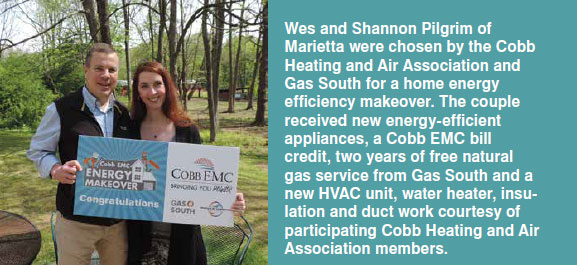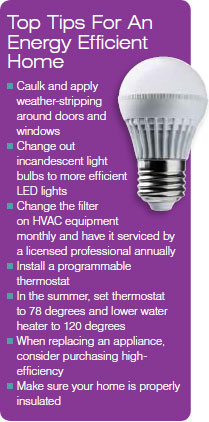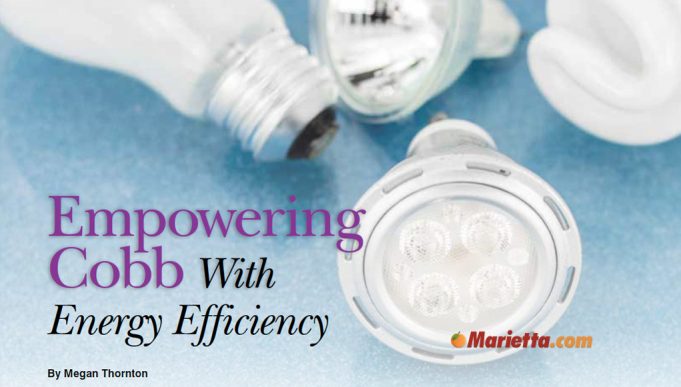According to the U.S. Department of Energy, the 115 million residences in America today collectively use an estimated 22.5 percent of the country’s energy. Much of this energy is wasted through leaky windows or ducts, old appliances, or inefficient heating and cooling systems, which means millions of Americans are throwing away money. The typical U.S. family spends at least $2,200 a year on home utility bills, and leading into the hotter summer months, cooling a home can sometimes mean skyrocketing costs.
Before you break into a sweat over these bills, review the tips below from Cobb County companies on the steps you can take now to make your home more energy efficient and help save you money and keep you comfortable all summer long.
Electric Efficiency
Already have a few energy efficiency measures in mind that you’d like to make on your home? Kevan W. Espy, vice president of marketing and corporate communications, says the biggest benefit that Cobb EMC offers to members is a low-interest loan for home energy efficiency improvements. “The loan process is very easy, convenient and appears as a line item on their power bill,” Espy says. “We also provide educational material and videos on our website that will assist our members in understanding and implementing energy efficiency measures.”
As a nonprofit electric cooperative that delivers electricity to more than 180,000 residential and commercial members in Cobb, Bartow, Cherokee, Fulton and Paulding counties, Cobb EMC helps members become more energy efficient and comfortable in their homes in several ways, including a free in-home energy audit. During the audit, a Cobb EMC representative will walk through the home and provide the member with a report that lists recommendations for improving the home’s efficiency. As an alternative, do-it-yourselfers can participate in an online energy audit.
In April, Cobb EMC hosted its annual energy efficiency seminar, where members heard from experts in the energy efficiency field who walked them through the various ways that they can save money and improve their comfort level by implementing energy efficiency measures in their home.
Espy says one of the most important steps a homeowner can take to make their home more energy efficient is to have their HVAC equipment serviced every year by a licensed professional. “Because we live in a very warm climate, it is imperative that homeowners have their air conditioning equipment serviced every spring,” Espy says. “Typically, the air conditioning equipment is the biggest user of electricity and therefore needs to be serviced to ensure it is operating properly.”
 HVAC Tips for a Happy House
HVAC Tips for a Happy House
Keeping the average home in Cobb County comfortable accounts for more of the energy used in the home than any other feature, says Barry G. Abernathy, president of E. Smith Heating & Air Conditioning Inc., and president of the Cobb Heating and Air Conditioning Association. According to a study by the Energy Information Administration of the U.S. Department of Energy, 48 percent of the energy consumed in a typical home goes to heating and cooling. “The more efficient a system is, the less energy it will use to do the job,” Abernathy says.
 According to the EPA website EnergyStar.gov, “Dirt and neglect are the top causes of heating and cooling system inefficiency and failure. To ensure efficient system operation, it’s important to perform routine maintenance.” A system that is not properly cleaned and maintained will simply use more energy than it should to do the job it was designed to do, Abernathy says. Just like routine maintenance of your car, proper maintenance by an HVAC professional will help extend the life of equipment and minimize unexpected breakdowns, he adds, noting repairs can get very expensive.
According to the EPA website EnergyStar.gov, “Dirt and neglect are the top causes of heating and cooling system inefficiency and failure. To ensure efficient system operation, it’s important to perform routine maintenance.” A system that is not properly cleaned and maintained will simply use more energy than it should to do the job it was designed to do, Abernathy says. Just like routine maintenance of your car, proper maintenance by an HVAC professional will help extend the life of equipment and minimize unexpected breakdowns, he adds, noting repairs can get very expensive.
Abernathy adds that using less energy also benefits the environment. “Most means of producing the energy we use generates greenhouse gases and possibly other pollutants,” he says. “A more efficient system in your home means you have a smaller impact on our environment.”
Besides scheduling an annual professional tune-up, homeowners can take a few simple steps to ensure optimal HVAC functionality. Keep the area around your outdoor A/C unit clean by keeping shrubs and plants trimmed, and don’t place anything on top of the unit that might block the fan. If you are comfortable doing so, check the filter regularly and change it as needed. Install a programmable thermostat and save energy by setting the temperature up or down, depending on the season, when you are asleep or away from home. Meredith Hodges, Gas South vice president of external affairs and human resources, says a programmable thermostat can save a household about 15 percent in energy costs. “In the summer, set your thermostat to 78 degrees or warmer with the fan switched to auto. If you turn it off, you will end up spending more money than you realize because your system has to work harder to get it to the temperature you want,” Hodges says.
Abernathy’s top tip: Don’t wait until it gets hot to call a professional. “All HVAC service companies get busy as it heats up and you may have to wait for a tune-up or other service,” he says. “A professional tune-up will get your system ready before you need it on that first steamy hot day. Your technician should make sure your system is clean, airflow is good and the A/C is properly charged with refrigerant to operate efficiently and use as little energy as possible.”
And when the time comes to replace an old system, spending a few more dollars up front for a higher efficiency HVAC unit will pay for itself many times over, he adds.
More Savings
A properly insulated house will also save you money, Hodges says. “Check pipes, walls, your attic, crawl spaces, basement and floors, as well as ventilator ducts and water pipes that pass through unheated areas such as the garage, basement and attic,” she says. “Seal cracks and leaks on doors and windows, and use caulk and weather-stripping around doors and windows to reduce air flow and energy loss. This will keep the cool air in during those warm summer months.”
When is the last time you inspected your heating and air ducts? Ensure the ducts that are in conditioned areas are as clean as possible. In unconditioned areas, such as an attic or vented crawl space, seal your ducts to prevent leaks.
A tip you may not have heard before is to lower your water temperature. This can save you about 3-5 percent in energy costs for each 10-degree reduction of your water heater temperature. Residents should also consider setting the water heater to 120 degrees and switching it to “vacation” mode when you’re away, Hodges adds.
Installing a low-flow showerhead is another good option. “Traditional showerheads deliver between 5 and 8 gallons of water per minute,” Hodges says. “The current standard for low flow showerheads is 2.5 gallons per minute at the same water pressure, so an investment of as little as $5 can cut the cost of a hot shower by 50 percent.”
Lastly, and it’s easy to forget, but make sure you’re also checking your furnace (along with your A/C unit filters) a minimum of three times a year to ensure maximum airflow and cooling efficiency.

















